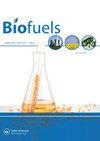十年来对可再生燃料标准和中西部三个州农业土地利用变化的政策评估:影响作物决策重大变化的变量并不全是乙醇
IF 2.6
4区 工程技术
Q3 ENERGY & FUELS
引用次数: 0
摘要
可再生燃料标准(RFS)在美国生物燃料产业的发展中取得了巨大成功。然而,反对者声称,可再生燃料标准直接导致了农业用地变化的增加,主要是玉米产量的增加以牺牲其他作物为代价。这项研究解决了这些说法,并得出结论,独立于RFS的多个变量影响了这些变化。研究了三大玉米生产州(爱荷华州、伊利诺伊州和内布拉斯加州)玉米和大豆种植面积的农业用地变化。本文对三类自变量进行了检验,以确定它们与农业土地利用变化的关系:(1)天气,包括作物生长和降水;(二)种植时的商品价格;(3)纳入自然保护区计划(CRP)的面积。对每个州变化最大的10个县也进行了微观分析。这一分析支持了这样的结论,即可再生燃料标准不能单独对农业用地变化负责。最显著的是,过量的种植季降水和商品价格对农业用地变化的影响最大。可再生燃料标准的成功不应与引起农业土地用途变化有关,因为可再生燃料标准只是一个更复杂系统的一个小组成部分。本文章由计算机程序翻译,如有差异,请以英文原文为准。
Policy evaluations of the Renewable Fuel Standard and agricultural land use changes in three Midwestern states for a decade: variables that influence significant changes in crop decisions are not all about ethanol
Abstract The Renewable Fuel Standard (RFS) has been highly successful in developing the biofuels industry in the United States. However, opponents claim the RFS is directly responsible for increased agricultural land use change, primarily increased corn production at the expense of other crops. This study addresses these claims and concludes multiple variables, independent of the RFS, impact these changes. Agricultural land use changes for acres planted in corn and soybeans in the top three corn-producing states (Iowa, Illinois and Nebraska) were studied. Three categories of independent variables were tested to determine their association with agricultural land use changes: (1) weather, including crop development and precipitation; (2) commodity prices at planting; and (3) acreage enrolled in the Conservation Reserve Program (CRP). A microanalysis of the 10 counties in each state with the most change was also conducted. This analysis supports the conclusion that the RFS cannot be solely responsible for agricultural land use change. Most notably, excessive planting season precipitation and commodity prices had the greatest influence on agricultural land use changes. The success of the RFS should not be associated with causing agricultural land use change, as the RFS is simply a small component of a more complex system.
求助全文
通过发布文献求助,成功后即可免费获取论文全文。
去求助
来源期刊

Biofuels-Uk
Energy-Renewable Energy, Sustainability and the Environment
CiteScore
5.40
自引率
9.50%
发文量
56
期刊介绍:
Current energy systems need a vast transformation to meet the key demands of the 21st century: reduced environmental impact, economic viability and efficiency. An essential part of this energy revolution is bioenergy.
The movement towards widespread implementation of first generation biofuels is still in its infancy, requiring continued evaluation and improvement to be fully realised. Problems with current bioenergy strategies, for example competition over land use for food crops, do not yet have satisfactory solutions. The second generation of biofuels, based around cellulosic ethanol, are now in development and are opening up new possibilities for future energy generation. Recent advances in genetics have pioneered research into designer fuels and sources such as algae have been revealed as untapped bioenergy resources.
As global energy requirements change and grow, it is crucial that all aspects of the bioenergy production process are streamlined and improved, from the design of more efficient biorefineries to research into biohydrogen as an energy carrier. Current energy infrastructures need to be adapted and changed to fulfil the promises of biomass for power generation.
Biofuels provides a forum for all stakeholders in the bioenergy sector, featuring review articles, original research, commentaries, news, research and development spotlights, interviews with key opinion leaders and much more, with a view to establishing an international community of bioenergy communication.
As biofuel research continues at an unprecedented rate, the development of new feedstocks and improvements in bioenergy production processes provide the key to the transformation of biomass into a global energy resource. With the twin threats of climate change and depleted fossil fuel reserves looming, it is vitally important that research communities are mobilized to fully realize the potential of bioenergy.
 求助内容:
求助内容: 应助结果提醒方式:
应助结果提醒方式:


